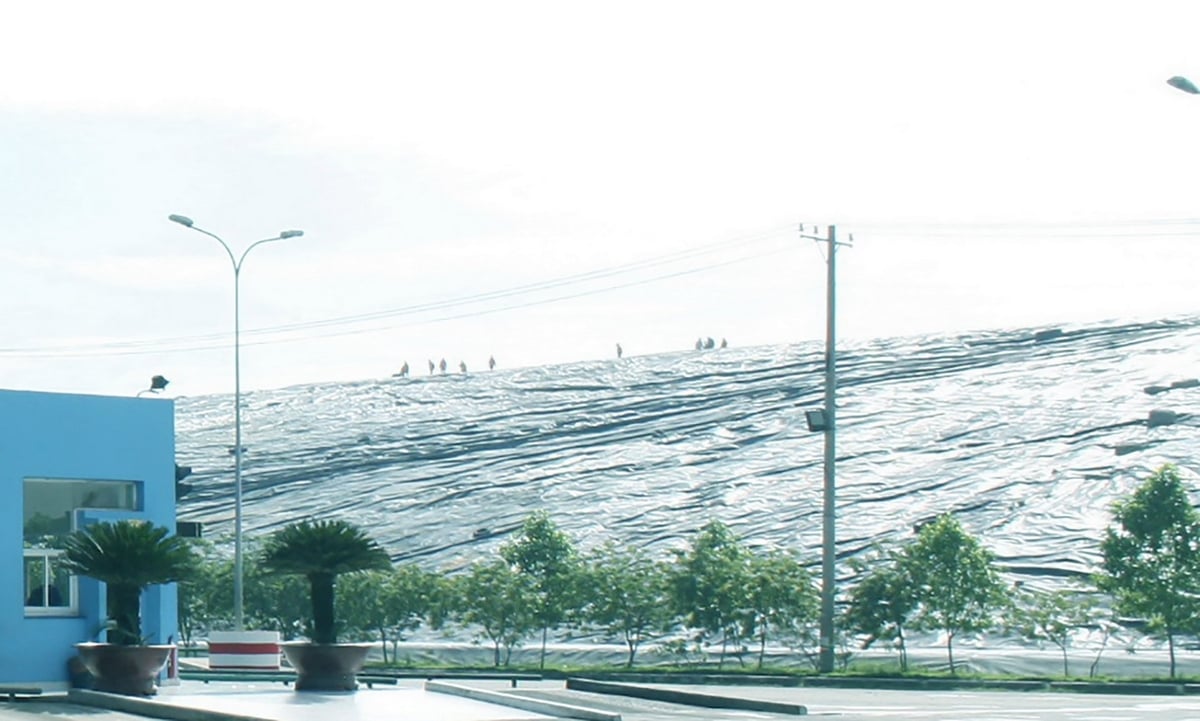November 7, 2025 | 18:52 GMT +7
November 7, 2025 | 18:52 GMT +7
Hotline: 0913.378.918
November 7, 2025 | 18:52 GMT +7
Hotline: 0913.378.918
In recent years, the former localities of Ho Chi Minh City (prior to the administrative merger) issued regulations on the management of municipal solid waste and implemented plans for waste segregation at source. At the same time, they developed and introduced service fees for the collection and transportation of municipal solid waste. Currently, the newly merged Ho Chi Minh City is restructuring its municipal solid waste management system under a two-tier local government model to ensure more effective waste collection, transportation, and treatment across the city.

A sanitary municipal solid waste landfill site in Ho Chi Minh City. Photo: Tuong Tu.
Currently, the total volume of municipal solid waste generated in Ho Chi Minh City is approximately 14,000 tons per day. Of this, the former Ho Chi Minh City area accounts for around 10,500 tons/day, the former Binh Duong area about 2,400 tons/day, and the former Ba Ria – Vung Tau area around 1,100 tons/day. The rate of waste collection, transportation, and treatment exceeds 99%; among this, roughly 40% of municipal solid waste is treated using incineration, recycling, or composting technologies, while the remaining 60% is disposed of in sanitary landfills.
In the coming period, to maintain key performance indicators in the field of municipal solid waste management - specifically, sustaining a collection, transport, and treatment rate of over 99%, and increasing the share of advanced and modern treatment technologies to over 90% by 2030 - the Department of Agriculture and Environment will advise the Ho Chi Minh City People’s Committee on issuing a municipal solid waste source-separation plan for the 2026–2030 period and will push for its strong and effective implementation.
In parallel, the Department of Agriculture and Environment will organize training and provide guidance for communes, wards, and special zones within Ho Chi Minh City on general environmental management. This includes managing and sorting municipal solid waste at source, as well as organizing bidding processes for waste collection, transportation, and treatment. The department will also review, advise, and propose that the city’s People’s Committee submit revisions to Resolution No. 28/2023/NQ-HDND dated December 8, 2023, to the City People’s Council for consideration and adjustment, ensuring alignment with current legal regulations and uniform application across the city. A key focus will be the transition to waste-to-energy incineration technologies.
The Ho Chi Minh City Department of Agriculture and Environment continues to coordinate with other departments to advise the City People's Committee on selecting investors for municipal solid waste treatment projects using a public-private partnership (PPP) model, and also on selecting investors for the Con Dao Special Zone's waste treatment project. It is also urging the completion of investment and construction procedures for the 1,000 tons/day, 20MW waste-to-energy plant at the Toc Tien centralized waste treatment area, and working on building, updating, and completing the city's waste management database system.
Ho Chi Minh City currently has four operational centralized waste treatment complexes with a total area of over 1,872 hectares. These include: the Northwest solid waste treatment complex (822 ha); the Da Phuoc integrated waste treatment and cemetery complex (over 813 ha); the Nam Binh Duong waste treatment complex (100 ha); and the Toc Tien centralized waste treatment complex (137 ha). In addition, three more complexes are in the planning stage and set to be developed, covering a combined area of 750 hectares.
Translated by Phuong Linh

(VAN) A wood pellet factory has been supporting forest growers certified under FSC standards to improve their income and promote sustainable forest protection.

(VAN) Associate Professor Dr. Pham Anh Tuan emphasized that clearly identifying target groups, production scale, and consumer markets is key to ensuring the sustainable development of Viet Nam’s coconut industry.

(VAN) More than 400 experts from domestic and international organizations attended the ACT Con 2025 conference, which aimed to connect technology developers with frontline conservation teams.

(VAN) Food irradiation technology is an innovative solution that extends shelf life and acts as a ‘golden visa’ enabling Vietnamese agricultural products to access the world’s most demanding markets.

(VAN) At Dinh My commune (An Giang province), Loc Troi Group recently organized Mini Expo 2025 under the theme ‘From technology to practice – Comprehensive cultivation solutions for crops.’
/2025/11/04/2510-4-162016_246.jpg)
(VAN) The launch of the 'Carbon for Good' project in Lai Chau opens up a new direction in forest management and protection, laying the foundation for developing carbon credits.

(VAN) Hai Phong is implementing a comprehensive greenhouse gas inventory program, promoting sustainable and eco-friendly development.